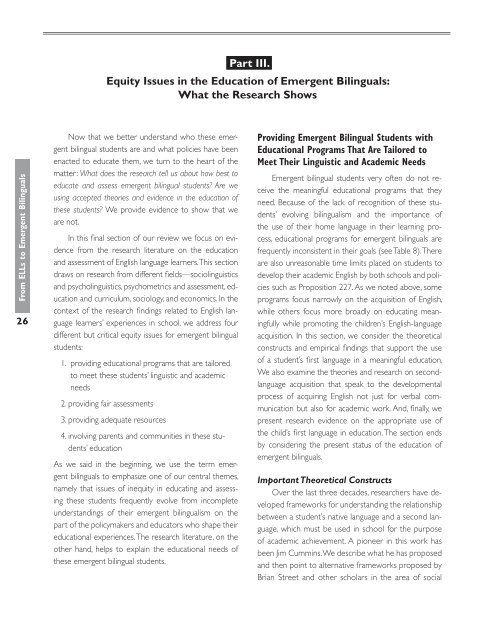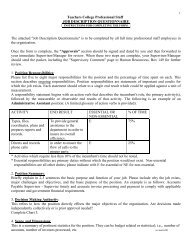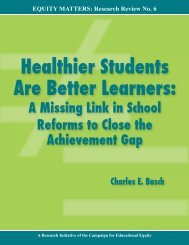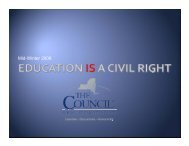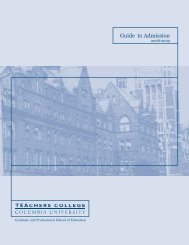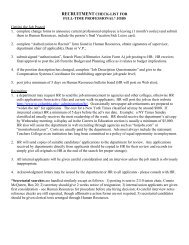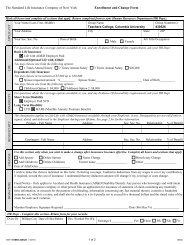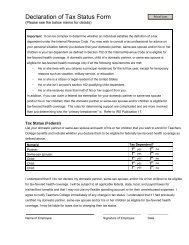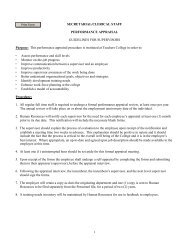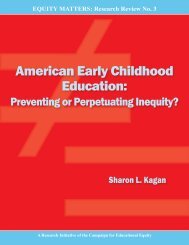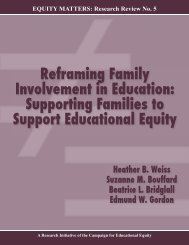From English Language Learners to Emergent Bilinguals - Teachers ...
From English Language Learners to Emergent Bilinguals - Teachers ...
From English Language Learners to Emergent Bilinguals - Teachers ...
You also want an ePaper? Increase the reach of your titles
YUMPU automatically turns print PDFs into web optimized ePapers that Google loves.
Part III.Equity Issues in the Education of <strong>Emergent</strong> <strong>Bilinguals</strong>:What the Research Shows<strong>From</strong> ELLs <strong>to</strong> <strong>Emergent</strong> <strong>Bilinguals</strong>26Now that we better understand who these emergentbilingual students are and what policies have beenenacted <strong>to</strong> educate them, we turn <strong>to</strong> the heart of thematter: What does the research tell us about how best <strong>to</strong>educate and assess emergent bilingual students? Are weusing accepted theories and evidence in the education ofthese students? We provide evidence <strong>to</strong> show that weare not.In this final section of our review we focus on evidencefrom the research literature on the educationand assessment of <strong>English</strong> language learners. This sectiondraws on research from different fields—sociolinguisticsand psycholinguistics, psychometrics and assessment, educationand curriculum, sociology, and economics. In thecontext of the research findings related <strong>to</strong> <strong>English</strong> languagelearners’ experiences in school, we address fourdifferent but critical equity issues for emergent bilingualstudents:1. providing educational programs that are tailored<strong>to</strong> meet these students’ linguistic and academicneeds2. providing fair assessments3. providing adequate resources4. involving parents and communities in these students’educationAs we said in the beginning, we use the term emergentbilinguals <strong>to</strong> emphasize one of our central themes,namely that issues of inequity in educating and assessingthese students frequently evolve from incompleteunderstandings of their emergent bilingualism on thepart of the policymakers and educa<strong>to</strong>rs who shape theireducational experiences. The research literature, on theother hand, helps <strong>to</strong> explain the educational needs ofthese emergent bilingual students.Providing <strong>Emergent</strong> Bilingual Students withEducational Programs That Are Tailored <strong>to</strong>Meet Their Linguistic and Academic Needs<strong>Emergent</strong> bilingual students very often do not receivethe meaningful educational programs that theyneed. Because of the lack of recognition of these students’evolving bilingualism and the importance ofthe use of their home language in their learning process,educational programs for emergent bilinguals are .frequently inconsistent in their goals (see Table 8). Thereare also unreasonable time limits placed on students <strong>to</strong>develop their academic <strong>English</strong> by both schools and policiessuch as Proposition 227. As we noted above, someprograms focus narrowly on the acquisition of <strong>English</strong>,while others focus more broadly on educating meaningfullywhile promoting the children’s <strong>English</strong>-languageacquisition. In this section, we consider the theoreticalconstructs and empirical findings that support the useof a student’s first language in a meaningful education.We also examine the theories and research on secondlanguageacquisition that speak <strong>to</strong> the developmentalprocess of acquiring <strong>English</strong> not just for verbal communicationbut also for academic work. And, finally, wepresent research evidence on the appropriate use ofthe child’s first language in education. The section endsby considering the present status of the education ofemergent bilinguals.Important Theoretical ConstructsOver the last three decades, researchers have developedframeworks for understanding the relationshipbetween a student’s native language and a second language,which must be used in school for the purposeof academic achievement. A pioneer in this work hasbeen Jim Cummins. We describe what he has proposedand then point <strong>to</strong> alternative frameworks proposed byBrian Street and other scholars in the area of social


